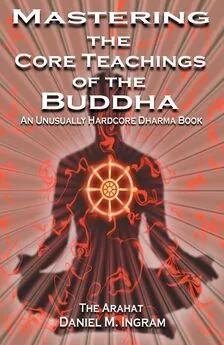Daniel Ingram - Mastering the Core Teachings of Buddha - An Unusually Hardcore Dharma Book
- Название:Mastering the Core Teachings of Buddha - An Unusually Hardcore Dharma Book
- Автор:
- Жанр:
- Издательство:Aeon Books
- Год:2009
- ISBN:9781904658405
- Рейтинг:
- Избранное:Добавить в избранное
-
Отзывы:
-
Ваша оценка:
Daniel Ingram - Mastering the Core Teachings of Buddha - An Unusually Hardcore Dharma Book краткое содержание
Mastering the Core Teachings of Buddha - An Unusually Hardcore Dharma Book - читать онлайн бесплатно полную версию (весь текст целиком)
Интервал:
Закладка:
It would be like saying: you are already a concert pianist, you just have to realize it, or you already are a nuclear physicist, you just have to realize it, or you already speak every language, you just have to realize it.
It would be like saying to a two-year old: you already understand everything you need to know so stop learning new things now, or to a severe paranoid schizophrenic: you already are as sane as anyone and do not need to take your medicines and should just follow the voices that tell you to kill people, or to a person with heart disease: just keep smoking and eating fried pork skins and you will be healthy, or to an illiterate person with no math skills who keeps having a hard time navigating in the modern world and is constantly ripped off: no need to learn to read and do math, as you are just fine as you are, or saying to a greedy, corrupt, corporate-raiding, white-collar criminal, Fascist, alcoholic wife-beater: hey, Dude, you are a like, beautiful perfect flower of the Now Moment, already enlightened [insert toke here], you are doing and not-doing just fine, like wow, so keep up the good work, Man.
Would you let a blind and partially paralyzed untrained stroke victim perform open-heart surgery on your child based on the notion that they already are an accomplished surgeon but just have to realize it?
Would you follow the dharma teachings of people who feed other 326
Models of the Stages of Enlightenment people this kind of crap? Those who imagine that everyone somehow in their development already became as clear and perceptive as they could be just by being alive is missing something very profound. Do they imagine that you can just remind people of these things and suddenly all wisdom and clarity will suddenly appear? This is mind-bogglingly naive.
I have gained so much that is good and lost so much that is bad by learning to practice well, learning to concentrate, learning the theory, learning insight practices, going through the organic process of the stages over decades, reading the stories, reading about the lives of the great practitioners, having dharma conversations with dharma friends, debating points, wrestling with difficult concepts and how to apply them to my actual life, teaching, learning, studying, playing with the powers, writing, realizing how things are, and delving deeply into the sensate world that I am astounded that anyone would want to try to reduce something so grand, wonderful, deep, rich, amazing and profound to such a paltry, ridiculous concept as the notion that all that is already in place in everyone regardless of what they have done or not done. All those benefits, skills, abilities, powers, states, stages, experiences, insights, and fundamental perceptual changes simply were not available until I did the work, took the time, participated in the process, and no amount of anyone telling me it was otherwise would have helped or made it so.
I know of no examples where the necessary and sufficient causes for the arising of these benefits did not involve some kind of work. In short, I say to those who persist in promoting the Nothing To Do School and the You Are Already There School: STOP IT! You are spreading craziness, and this is craziness that many people will not be able to tell is craziness, and that appears to include those who promote these fallacies.
While I usually do not go so far as to tell people that there is something so deeply wrong with what they think and how they communicate it that they should stop it immediately and forever, this particular point is a great example of something I consider abhorrent and worthy of profound revision.
Regardless of any kind intentions, the teachings of these schools take a half-truth that seems so very nice and seductive to us neurotic practitioners who just can barely stand another achievement trip and 327
Models of the Stages of Enlightenment
have such a hard time with self-acceptance and turn that distortion into sugary poison. There is no need to tie the three useful concepts of 1) no-self, 2) self-acceptance in the ordinary sense, and 3) the notion that the sensations that lead to understanding if clearly perceived over and over again are manifesting right here, right now, to such a perversely twisted yet seemingly benign and similar concepts as the ones they unfortunately promote.
FINAL POINTS
Spirituality that ignores or covers up our inevitable dark or undesirable sides is doomed to be bitten and burned by them. Models of realization that involve high ideals of human perfection have caused so much dejection, despair and misguided effort throughout the ages that I have no qualms about doing my very best to try to smash them to pieces on the sharp rocks of reality. They are not completely useless, and there is some value in keeping the standards to which we aspire high as we will see in the next chapter, but most of the time are taken way too seriously to be helpful at all.
It is clear that those who adhere the most rigidly to the self-perfection models of enlightenment are also very often those who believe enlightenment is the least attainable and feel the most disempowered in their practice and spiritual life. Not surprisingly, those with the highest standards for what realization will entail often have the lowest standards for their own practice and what they hope to actually attain in this lifetime. They are the armchair quarterbacks of the spiritual path. Becoming grandiose about aspiring to a high ideal seems to be a common coping mechanism for dealing with a lack of
confidence and insight. As Christopher Titmuss, one of my best and most honest teachers, often says, “We do not come from a self-perfection lineage.” There are those who do explicitly come from self-perfection lineages. I wish them good luck. They’ll need it.
328
Mastering the Core Teachings of the Buddha
31.SO WHAT’S “FULL ENLIGHTENMENT”? *
This has been a source of considerable debate, confusion and division in Buddhism, particularly between the three main traditions of the Theravada, Tibetan, and Zen. I am going to jump into the fray, as is my typical style, but realize that it is going to be a messy business. These debates tend to boil down to arahats vs. buddhas, a distinction I hope to make clear shortly. Zen is largely on the side of buddhas, though their intriguing vagueness on the subject can at times make it somewhat uncertain what they mean by “buddha.” Most of the time the Zen kids actually seem to mean “arahat” when they say “buddha,” though I wouldn’t go around saying that if you want to be liked. In my more cynical moments, I think their models end at stream entry. On the other hand, the most mythological descriptions of arahats in the Theravada are often closer to the stylized descriptions of buddhas, so the problem is obviously widespread and goes both ways. All kinds of absurd tensions and divisions have arisen around this one point between the Theravada and the Mahayana when, at least in terms of actual dogma, there is really no conflict. How these ideals relate to non-Buddhist traditions is complex, and I offer the simple notion that these things all converge rather than diverge at this level.
The Theravada clearly acknowledges that an arahat is a stage below buddhahood, and nouveau Tibetans seem particularly gleeful at this.
(To digress again for just a moment, there is an apocryphal and absurd story in circulation that when the teachings on emptiness were first given, a large number of arahats dropped dead of heart attacks. This tends to cause conceited laughter and smiles on the faces of nouveau Tibetan Buddhists, which is about as sick a reaction as I can imagine.
When will this sort of vile and absurd defamation of other valuable traditions end?) The arahat has attained to the complete and utter elimination of the illusions of permanence, satisfactoriness, and duality (separate self), and now perceives reality non-dualistically. They know the joy and clarity of freedom, as well as the fullness of their humanity.
Thus, the notion that an arahat is “self-realized” is an oxymoron perpetuated by regular morons.
So What’s “Full Enlightenment”?
Arahatship may correlate with the 6th bhumi or the 8th bhumi in the Tibetan model, depending on the sources of information. There are also reasons to associate it with the 10th bhumi, but I digress. Some Tibetan Buddhists will tell you that the four paths and the ten bhumis are two divergent tracks of awakening, but this is a load of equine excrement. Ditching the split is ditching the split, and the rest is gravy.
Enlightenment is exactly the same regardless of the tradition one followed to attain it. This is non-negotiable, and those who say otherwise are merely doing so for recruiting purposes or because they don’t know any better or both.
However, it is clearly stated by both traditions that arahats may not have completely integrated their understanding into their life and so may not have eliminated all “unskillful” residual habits, although defining “unskillful” here is as problematic as defining “appropriate.”
There are many stories in The Vi
naya and in modern times about
arahats behaving in strange ways, and this goes ten times for buddhas in the Mahayana and Vajrayana literature and today.
Regardless of how you define “unskillful,” eliminating all “unskillful”
residual habits is sometimes seen as such an undertaking that many schools of Buddhism hold it to be an absurd and impractical ideal.
However, there is some place for such high standards if they are supplemented with a very big dose of reality, patience and a sense of humor.
Buddhas are defined as having mastered all of the concentration states and psychic powers, whereas arahats may or may not have. (It should be noted that even unenlightened beings can master almost all of the psychic powers and all of the concentration states.) Buddhas are defined as having understood the teachings and the truth of things “to the very end,” whereas arahats have just fully understood these. The distinction here is lost on me.
Further, both sides also state clearly that there are bodhisattvas that may one day become buddhas. Again, to stick around requires being nothing but empty awareness or dharmakaya (in True Self terms), as this is all that is permanent but not a thing or localized in a specific place, etc. as before. This understanding is clearly present in arahats, bodhisattvas of the 8th bhumi and above, and buddhas. Thus, this 330
So What’s “Full Enlightenment”?
whole bodhisattva thing and all the talk of the Buddha manifesting as a bodhisattva is just a skillful True Self or dharmakaya teaching, as before, and not actually in conflict with the Theravada except to those who misunderstand what these teachings are really talking about.
It is this sort of confusion that starts all sorts of absurd and completely useless conversations about rebirth that take away time from real practice and useful inquiry. All talk of Buddha Nature is actually this same True Self teaching, as before. Balanced and strong understanding of both emptiness and compassion is vital for
understanding the Middle Way and for benefiting others, and this point is found in all the Buddhist traditions of which I am aware.
Remember how, in the beginning of Part II, I stated that the point of all of this is to become a master of the relative and the ultimate? When one becomes an arahat, which could from one point of view be considered becoming a master of the ultimate, then the relative world of phenomena is fully understood to also be the ultimate. This then naturally brings in the ideal of Buddhahood as the next logical standard to aspire to, as suddenly one cannot truly be a master of the ultimate without also being a master of the relative. Go become an arahat and see for yourself what conclusion you draw from your experience.
Читать дальшеИнтервал:
Закладка:





![Дженнифер Гюнтер - The vagina book. Главная книга для тех, у кого есть этот орган [litres]](/books/1061538/dzhennifer-gyunter-the-vagina-book-glavnaya-kniga-dl.webp)




